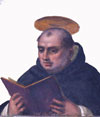Reflections on a Copy of An Aquinas Reader On the whole I am glad that Catholics, particularly the young ones, are rediscovering the Catholic wisdom that the Catholic establishment has chosen to ignore or forget the past 50 years. However sometimes in the face of a rediscoverer's Eureka-shouting enthusiasm for Catholic wisdom, I am tempted to snap, "Yes, I know all about Thomas Aquinas! I was reading Thomas Aquinas in 1980 when you were a small child or in absentia from the church!" It is remarkable that a person born in 1961 and educated in Catholic schools in the '60s, '70s and '80s should know anything of St. Thomas Aquinas. My parents were exposed to him in their Pennsylvania coal-town high school circa 1940. Their religion textbook contained his five proofs of God's existence and other apologetics justifying the Catholic Church, but by my schooldays, such argument was regarded as too embarassingly Catholic or outdated in light of all of the philosophical and scientific "progress" that Man has made in the past seven hundred years. Nevertheless in the void of late 20th-Century Catholicism, there were airpockets where one could still breathe Catholic philosophers. I was lucky enough to be in them. One was Georgetown Prep which had on its faculty Father John Nicola. Fr. Nicola taught seniors a class in Philosophy (really Aquinas) and his syllabus was based on Summa Theologica. This was my first exposure to the Angelic Doctor and I was hooked. I found it eerily coincidental that I was in Fr. Nicola's Aquinas class in 1978-79, during the first months of John Paul II's papacy. No one had any idea that the new pope was possibly the greatest Catholic philosopher since Aquinas. Catholic University also made every student take Philosophy 101 and this provided further exposure. One of the textbooks was the thick green paperback, An Aquinas Reader, edited with an introduction by Mary T. Clark and published by Image Books. Write what other writers--and sometimes I, myself--will write about Georgetown Prep and Catholic U., these schools offered something that was very rare and precious at a time when it was needed. In addition to An Aquinas Reader, I also had my father's textbooks on Thomism used at Georgetown University in the good old days when Jesuits were really the pope's marine corps. In a world where objective truth is denied and where as Belloc correctly observed, logic is dead, I became conscious of such propositions that denying truth is a theoretical absurdity: If there is no truth, the statement that there is no truth is not true. And that a thing cannot both be and not-be at the same time. I knew that there were differences between ideas, judgment and reasoning. I learned to make distinctions and to think. One day my Catholic U. classmate David Thompson asked to borrow my copy of An Aquinas Reader. I gave it over knowing that anything lent to Thompson might as well be given a goodbye kiss. Indeed, months later when I brought up the book's return, David told me that during a period of intense study, he had thrown my Aquinas reader against a wall and that it had landed on the floor a pile of loose signatures. David Thompson eventually became a priest. He was a very good and beloved priest. However the priesthood was not what he needed himself. He committed suicide. I promised myself I would pick up another copy of An Aquinas Reader some time. To my library over the years was added A Tour of The Summa, Msgr. Paul J. Glenn's excellent paraphrasing of Aquinas' work for those who don't want to tackle the original. Reading Aquinas is like trying to wade through gravel and in no way should these reflections convey the impression that this writer is an expert in Thomism. I also read F.C. Copleston's book, G.K. Chesterton's Saint Thomas Aquinas "The Dumb Ox," and James A. Weisheiple, O.P.'s Friar Thomas D'Aquino: His Life Thought & Works. For a while, I wanted to become a Philosophy professor myself and inquired at Catholic U. about pursuing the degrees. However the prospect of spending lots of money to enter a low-paying profession that seemed to be dying, to try to teach something that was unwelcome at most universities, was too impractical. As it turns out, there might have been a niche for me in Catholic academia after the sea-changing papacy of John Paul II, but I still think that two of the best things that ever happened to me were A) not becoming a lawyer and B) not becoming a Philosophy professor. I often listen to a fundamentalist radio station because I like the music and Catholics aren't smart enough to get up anything like a radio network that plays music most of the time. In between Wondrous Love and My Shepherd Will Supply My Need and pleas to help Christianize countries such as Italy that have never heard the Word of God, I hear preachers and theologians talking about God being, of necessity, an uncreated being. Of course, they also go on about Intelligent Design. The necessary being is Aquinas' third proof of God's existence while Intelligent Design is his fifth. "You snake-handlin' bastards!" I mutter to the radio, "You never got that from any bible!" A few weeks ago I was helping an old friend--also a Georgetown Prep and Catholic U. graduate--clean out his family home which happens to be near the Georgetown Prep campus, about 2500 feet from the classroom where Fr. Nicola introduced seniors to Thomistic Philosophy. The friend told me to help myself to any of the contents of a box of books. Opening the box, I found a copy of An Aquinas Reader. I look forward to renewing an old friendship. |
|
Copyright 2006, 2011 by Neal J. Conway. All rights reserved.
 |
 |
 |
 |
 |
|---|